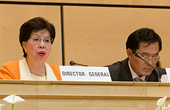U.S. and Russia will keep smallpox viruses, but the destruction “is imminent”
Published on Wed, 2011-05-25 06:01
Sources: Third World Network, LiveScience, The Wall Street Journal The World Health Assembly decided on Tuesday in Geneva to keep, for now, the world's remaining smallpox virus samples, kept alive by U.S. and Russia, with the opposition of developing countries and civil society organisations headed by the Third World Network (TWN). The governing body of the World Health Organization (WHO) decided by consensus, as recommended a committee of experts, to revisit the issue in three years at the next annual meeting, in 2014. In the meantime, new researches using the smallpox virus will be limited to the allowed studies started before now, reported LiveScience specialised portal. According to Lim Li Ching, expert of TWN, “attempts by the United States to prolong the retention of variola (smallpox) virus stocks have been thwarted at the WHA”. “The decision followed contentious discussions on a draft resolution, proposed by the US and several co-sponsors, that would have allowed continued retention of the existing virus stocks, with a report on progress of research only in five years time (2017), at the 69th WHA. Despite an informal working group meeting to deliberate the issue, there was no consensus and a decision was then made to defer the discussion on the draft resolution. In the final decision adopted on 24 May, the WHA decided to strongly reaffirm the decisions of previous WHA sessions that the remaining stocks of variola virus should be destroyed,” wrote Lim on a report. The discussion of what to do with the remaining stocks of the virus has been raging since the WHO declared the disease eradicated in 1980. The two stockpiles are located at the Center for Disease Control in Georgia, U.S., and at a facility in Siberia, Russia. Over the years the virus has received several stays of execution as nations and scientists argued over what work remained to do. With the committee's decision, the debate is expected to continue. The decision, took after two days of discussion in Geneva, is disappointing for the many people who advocate for immediate destruction of the smallpox stocks, especially those nations unprepared for an outbreak. It is a win for the United States and Russia, though, which have remained insistent that the virus should be kept around a while longer. "The outcome shows destruction is imminent," said TWN expert Edward Hammond, who attended the committee hearings. The U.S-led resolution didn't succeed despite intense lobbying, he said, and U.S. and Russian smallpox research efforts face continued scrutiny from the WHO and a recently created independent panel of experts. "I have never seen the U.S. put more time and effort into trying to get a resolution passed," he said. "We are still reasonably positive of this outcome," Hammond said LiveScience reporter. "We wish it was better, but it could be far worse." The primary concern among many experts is that the virus will return as a bioweapon derived from secret stockpiles, synthesized in a laboratory or through other, closely related pox viruses. Researchers say they need to keep the virus around a little longer so they can complete work on a safer version of the vaccine and treatments for those already infected. More information: Smallpox Biosafety (website supported by TWN) |
SUSCRIBE TO OUR NEWSLETTER



